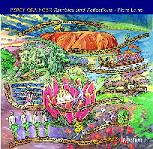Like most pianist/composers of his generation, Percy Grainger was bitten by the transcription bug, and he tailored a wide variety of compositions from William Byrd to George Gershwin to suit his idiosyncratic keyboard virtuosity. Piers Lane rises to this repertoire’s not-inconsiderable challenges in a judiciously programmed and brilliantly executed recital for Hyperion. It’s true that Byrd’s Carman’s Whistle Variations, Dowland’s Now, o now, I needs must part, Brahms’ Lullaby, Tchaikovsky’s Waltz of the Flowers, and the Hornpipe from Handel’s Water Music can sound unnaturally upholstered due to Grainger’s fondness for full, orchestrally-inspired sonorities (lots of hand-crunching chordwork and unwieldy octave doublings that sound easier than they are to play); but Piers Lane’s suave fingerwork and splendid ear for textural differentiation save the day. Notice too how effortlessly Lane keeps the melody and accompanimental filigree in perspective throughout Fauré’s Aprés un rêve and Nell. Lane also does a marvelous job with Grainger’s unabashedly lush and affectionate treatment of Cyril Scott’s Handelian Rhapsody, recorded here for the first time.
Although no one lets go at the climaxes in Ramble on Love (based on the Presentation of the Rose from Richard Strauss’ Der Rosenkavalier) with the abandon that Grainger himself displays in his two recordings of the piece, Lane’s sensitive, polished rendition matches Marc-André Hamelin’s earlier Hyperion recording. Lane slightly surpasses Hamelin in Maguire’s Kick (the first of Stanford’s Four Irish Dances) by virtue of his more forceful articulation of the ornaments and melodic turns. Lane saves one of Grainger’s most bizarre and remarkable arrangements for last. “Lullaby” embeds Stephen Foster’s “Camptown Races” in a haze of repeated notes representing what Grainger calls a “musical glasses” effect in the style and spirit of a marimbaphone. Grainger notates these gestures with surgical precision regarding dynamics and tempo, and the cumulative result proves nearly as hypnotic as the minimalist aesthetic they foreshadow. In sum, a Grainger anthology that easily stands with superb recorded efforts on behalf of the composer by the aforementioned Hamelin, Janine Sowden (ASV), and Martin Jones (Nimbus). [11/30/2002]
































